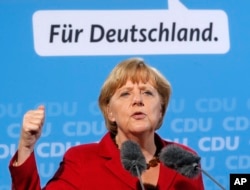FRANKFURT, GERMANY —
With signs of an economic recovery in sight, several countries in the European Union, including Poland and Romania, have been discussing the issue of low minimum wages. But the debate has intensified in Germany, the only European Union country without a minimum wage law. The issue has been at the center of the debate between incumbent German Chancellor Angela Merkel and Peer Steinbrück of the Social Democratic Party, her opponent in the federal elections set for later this month.
Sabine Theodono, 33, works as a hairdresser in a small beauty salon outside the city of Frankfurt.
At $6.50 (5 euros) an hour, hairdressers are among the lowest paid workers in Germany, where, according to the German Federal Statistics Office, the number of people living in poverty is now 12 million, and increase of about 400,000 people over the last decade.
"I work 40 hours a week, but if I wasn’t married and had to support myself with my salary, it would be impossible to pay the bills. With the prices we have now in Germany, it would be absolutely impossible,” said Sabine.
Germany's Social Democratic Party has made the minimum wage the dominant issue in the current political campaign. Their candidate for the post of chancellor, Peer Steinbrück, has recommended an hourly wage of $11.00 (8.50 euros) for all German workers and vowed to pass a minimum wage law in the first 100 days on the job.
"We are talking about euro rescue. We are talking about loans to other countries, and then of course, it’s harder to sell to the German public that people within your own country are suffering. That’s why the opposition parties have tried to make this issue an election issue," said Carsten Brzeski, an economist at ING Bank.
Chancellor Angela Merkel was originally opposed to a minimum age law, but now campaigns on the idea that industries and the unions should decide their own minimum wage by collective bargaining.
Her Christian Democratic Party fears a national minimum wage will make German products uncompetitive and eliminate millions of jobs. They also point to countries like France, where a high minimum wage of $12.50 (9.43 euros) an hour made employers reluctant to hire and is considered a leading cause of high youth unemployment.
"That is something that has clearly undermined the competitiveness in many European countries," said Carsten Brzeski. "France and Belgium are such examples, where due to high costs their companies lost market shares. There is always a very thin line balancing between the urgently needed exports that all EU countries need and at the same time having some kind of social justice within the country."
The biggest question in the debate in Germany is who will support the higher salaries and who will pick up the tab - customers, or the government?
"We can pay a higher wage, but we will need help from the government," said Kida Imran, the owner of a small hair salon in the southwestern city of Mainz. "There are so many taxes here in Germany. If they were lower, then businesses would have some relief and could pay their employees a little more."
The debate in Germany comes amid upbeat news of higher-than-expected economic growth, an export surplus and relatively low unemployment compared to other EU countries.
According to ING's Brzeski, whoever wins the chancellor elections should use the momentum to settle the minimum wage debate for good.
"Some kind of minimum standard will come, because it’s very hard to explain to people that the economy is really running like a stream train but that not everyone is benefiting from it," said Brzeski.
According to a European Union study released in July, the country with the highest minimum wage in the EU is Luxembourg, while the lowest minimum wage is in Bulgaria. The German elections are September 22.
Sabine Theodono, 33, works as a hairdresser in a small beauty salon outside the city of Frankfurt.
At $6.50 (5 euros) an hour, hairdressers are among the lowest paid workers in Germany, where, according to the German Federal Statistics Office, the number of people living in poverty is now 12 million, and increase of about 400,000 people over the last decade.
"I work 40 hours a week, but if I wasn’t married and had to support myself with my salary, it would be impossible to pay the bills. With the prices we have now in Germany, it would be absolutely impossible,” said Sabine.
Germany's Social Democratic Party has made the minimum wage the dominant issue in the current political campaign. Their candidate for the post of chancellor, Peer Steinbrück, has recommended an hourly wage of $11.00 (8.50 euros) for all German workers and vowed to pass a minimum wage law in the first 100 days on the job.
"We are talking about euro rescue. We are talking about loans to other countries, and then of course, it’s harder to sell to the German public that people within your own country are suffering. That’s why the opposition parties have tried to make this issue an election issue," said Carsten Brzeski, an economist at ING Bank.
Chancellor Angela Merkel was originally opposed to a minimum age law, but now campaigns on the idea that industries and the unions should decide their own minimum wage by collective bargaining.
Her Christian Democratic Party fears a national minimum wage will make German products uncompetitive and eliminate millions of jobs. They also point to countries like France, where a high minimum wage of $12.50 (9.43 euros) an hour made employers reluctant to hire and is considered a leading cause of high youth unemployment.
"That is something that has clearly undermined the competitiveness in many European countries," said Carsten Brzeski. "France and Belgium are such examples, where due to high costs their companies lost market shares. There is always a very thin line balancing between the urgently needed exports that all EU countries need and at the same time having some kind of social justice within the country."
The biggest question in the debate in Germany is who will support the higher salaries and who will pick up the tab - customers, or the government?
"We can pay a higher wage, but we will need help from the government," said Kida Imran, the owner of a small hair salon in the southwestern city of Mainz. "There are so many taxes here in Germany. If they were lower, then businesses would have some relief and could pay their employees a little more."
The debate in Germany comes amid upbeat news of higher-than-expected economic growth, an export surplus and relatively low unemployment compared to other EU countries.
According to ING's Brzeski, whoever wins the chancellor elections should use the momentum to settle the minimum wage debate for good.
"Some kind of minimum standard will come, because it’s very hard to explain to people that the economy is really running like a stream train but that not everyone is benefiting from it," said Brzeski.
According to a European Union study released in July, the country with the highest minimum wage in the EU is Luxembourg, while the lowest minimum wage is in Bulgaria. The German elections are September 22.





